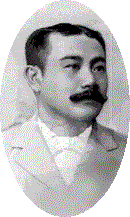Aniceto Lacson
This article needs additional citations for verification. (May 2014) |
Aniceto Lacson | |
|---|---|
 | |
| 1st President of Negros | |
| In office November 5, 1898 – April 30, 1901 | |
| Preceded by | Position established |
| Succeeded by | Melecio Severino (as Civil Governor) |
| Personal details | |
| Born | April 17, 1857 Molo, Iloílo, Captaincy General of the Philippines |
| Died | February 3, 1931 (aged 73) Talisay, Negros Occidental, Philippine Islands |
| Citizenship | Philippine |
| Nationality | Negrense |
| Political party | Katipunan |
Aniceto Ledesma Lacson (April 17, 1857 – February 3, 1931) was the first and only president of the Negros Republic from 1898 to 1901. He is notable for leading the Negros Revolution along with Juan Araneta. He is also an essential figure amongst Negros Occidental's landed gentry where he not only contributed significantly to the burgeoning sugar industry, but also helped shaped the political landscape of the province during his time.[1]
Early life
A Filipino statesman of Chinese-Mestizo origin,[2] Lacson, a doyen of the prominent Lacson family, was the fifth son of eight children of Lucio Petronila Lacson and Clara Ledesma Lacson of Iloilo who migrated to Negros when he was still young (1860s).
Lacson began his early education under private tutelage in Molo, Iloilo, and later pursued commerce at the Ateneo Municipal de Manila. His classmates included notable figures such as Juan Araneta and José Rizal, who, like Lacson, would later fight in the Philippine Revolution. During his studies in Manila, Lacson met Andrés Bonifacio, co-founder of the Katipunan, and entered into a secret blood compact with him. This honor made Lacson the only Negrense to become a member of the revolutionary society.
Of those siblings, he is the brother of Domingo Lacson Sr., the founder of Sta. Clara Estate Inc., and Don Mariano Lacson, who is famously known for building the iconic Lacson Ruins of Talisay City, which is also located very close to Aniceto's Casa Grande Mansion. Altogether, they are part of the rich history of sugar barons in the Western Visayas Region.
The Republic of Negros
The Spanish Governor of Negros Island, Isidro Castro, surrendered to forces under Aniceto Lacson and Juan Araneta at Bacolod on 6 November 1898. The Cantonal Republic of Negros was established with Aniceto Lacson as its president from November 27, 1898, until March 4, 1899, when the Negros revolutionaries surrendered to the United States General James Francis Smith. The government lasted for three months and four days.
Properties
When his father became bedridden, Lacson took charge of all the work in the haciendas and did much to improve the properties. As a result, through his efforts his father became one of the richest men in Negros and the Philippines. When the time came to divide his father's properties, his other brothers chose the best haciendas. He, for his part, chose the uncultivated ones. Thus, he received more land from his father than his brothers. Through hard work, he improved all the land and turned it into one of the best producing haciendas in Negros.
In the later 19th century, a Swiss businessman by the name of Luchinger decided to sell his vast properties in Matabang,Talisay, which he earlier purchased from Nicholas Loney, the biggest sugar cane producer in Negros at that time. It was offered to Aniceto Lacson, but he did not have enough ready cash. Luchinger was willing to sell it on installment but Aniceto's father Lucio refused as the venture appeared risky. Aniceto negotiated with Luchinger to agree to sell it to him without guarantor. Knowing that Aniceto was hardworking, honest and followed through with his business commitments, Luchinger agreed.
His Mansion in Talisay City,Negros Occidental, popularly known as Casa Grande, is owned by his descendants the Claparols family.
Family

Aniceto first married Rosario Araneta, a direct descendant of both the Kabungsuan royal family of Mindanao, and the elite Araneta clan of the Philippines. Rosario is the daughter of Patricio Cabunsol Araneta and Leoncia Araneta, with whom he sired eleven children. They were:
- Jesusa, the eldest, married Jose Maria Arroyo y Pidal, her second cousin. Jesusa and Jose are the grandparents of Atty. Jose Miguel Arroyo, husband of President Gloria Macapagal-Arroyo.
- Emilio and
- Clotilde, both of whom died at an early age.
- Carmen, married Ricardo Claparols, a Spaniard
- Enriqueta, married Domingo Lacson II, son of Domingo Lacson Sr.
- Isaac, who became governor of Negros, then congressman and senator of the Republic, married Carmen Paterno;
- Mariano, married Lilia Montilla;
- Perfecta, married Santiago Franco;
- Jose, died young;
- Aniceto, Jr., married Aurora Lacson, a cousin; and
- Dominador, married Visitacion Lacson, another cousin.
With his second wife, Magdalena Torres, a Spanish Mestiza, he had 10 children. They were:
- Resureccion, married Carlos Sackermann;
- Margarita, a former Miss Negros Occidental, married William Gemperle;
- Leonila, married Angel Gamboa;
- Leoncia, single born 6 December 1903 died 29 June 1981;
- Nicolas, married Amparo Lacson– the sister of Mayor Arsenio Lacson; they are the parents of Australian-Filipino socialite, Rose Lacson, of Perth, Australia;
- Juan, married Reymunda Villareal;
- Jose, married Estelita Adrias;
- Lucio, a Marine Engineer married to Consuelo Flores;
- Luis, married Lily Distajo;
- Consuelo, married Sebastian Corro, a Spanish Mestizo.
Ancestry
| Ancestors of Aniceto Lacson | |||||||||||||||||||||||||||||||||||||||||||||||||||||||||||||||||||||||||||||||||||||||||||||||||||||||||||||||||||||||||||||||||||||||||||||||||||||||||||||||||||||||||||||||||||||||||||||||||||||||||||||||||||||||||||||||||||||||||||||||||||||||||||||||||||||||||||||||||||||||||||||||||||||||||||||||||||||||||||||||||||||||||||||||||||||||||||||||||||||||||||||||||||||||||||||||||||||||||||||||||||||||||||||||||||||||||||||||||||||||||||||||||||||||||||||||||||
|---|---|---|---|---|---|---|---|---|---|---|---|---|---|---|---|---|---|---|---|---|---|---|---|---|---|---|---|---|---|---|---|---|---|---|---|---|---|---|---|---|---|---|---|---|---|---|---|---|---|---|---|---|---|---|---|---|---|---|---|---|---|---|---|---|---|---|---|---|---|---|---|---|---|---|---|---|---|---|---|---|---|---|---|---|---|---|---|---|---|---|---|---|---|---|---|---|---|---|---|---|---|---|---|---|---|---|---|---|---|---|---|---|---|---|---|---|---|---|---|---|---|---|---|---|---|---|---|---|---|---|---|---|---|---|---|---|---|---|---|---|---|---|---|---|---|---|---|---|---|---|---|---|---|---|---|---|---|---|---|---|---|---|---|---|---|---|---|---|---|---|---|---|---|---|---|---|---|---|---|---|---|---|---|---|---|---|---|---|---|---|---|---|---|---|---|---|---|---|---|---|---|---|---|---|---|---|---|---|---|---|---|---|---|---|---|---|---|---|---|---|---|---|---|---|---|---|---|---|---|---|---|---|---|---|---|---|---|---|---|---|---|---|---|---|---|---|---|---|---|---|---|---|---|---|---|---|---|---|---|---|---|---|---|---|---|---|---|---|---|---|---|---|---|---|---|---|---|---|---|---|---|---|---|---|---|---|---|---|---|---|---|---|---|---|---|---|---|---|---|---|---|---|---|---|---|---|---|---|---|---|---|---|---|---|---|---|---|---|---|---|---|---|---|---|---|---|---|---|---|---|---|---|---|---|---|---|---|---|---|---|---|---|---|---|---|---|---|---|---|---|---|---|---|---|---|---|---|---|---|---|---|---|---|---|---|---|---|---|---|---|---|---|---|---|---|---|---|---|---|---|---|---|---|---|---|---|---|---|---|---|---|---|---|---|---|---|---|---|---|---|---|---|---|---|---|---|---|---|---|---|---|---|---|---|---|---|---|---|---|---|---|---|---|---|---|---|---|---|---|---|---|---|---|---|---|---|---|---|---|---|---|---|---|---|---|---|---|---|---|---|---|---|---|---|---|---|---|---|---|---|---|---|---|---|---|---|---|
| |||||||||||||||||||||||||||||||||||||||||||||||||||||||||||||||||||||||||||||||||||||||||||||||||||||||||||||||||||||||||||||||||||||||||||||||||||||||||||||||||||||||||||||||||||||||||||||||||||||||||||||||||||||||||||||||||||||||||||||||||||||||||||||||||||||||||||||||||||||||||||||||||||||||||||||||||||||||||||||||||||||||||||||||||||||||||||||||||||||||||||||||||||||||||||||||||||||||||||||||||||||||||||||||||||||||||||||||||||||||||||||||||||||||||||||||||||
See also
References
External links
- Filipino generals
- People of the Philippine Revolution
- 1857 births
- 1931 deaths
- People from Iloilo City
- 20th-century Filipino businesspeople
- People from Negros Occidental
- Ateneo de Manila University alumni
- Governors of Negros Occidental
- Filipino revolutionaries
- 19th-century Filipino businesspeople
- People from the Spanish East Indies
